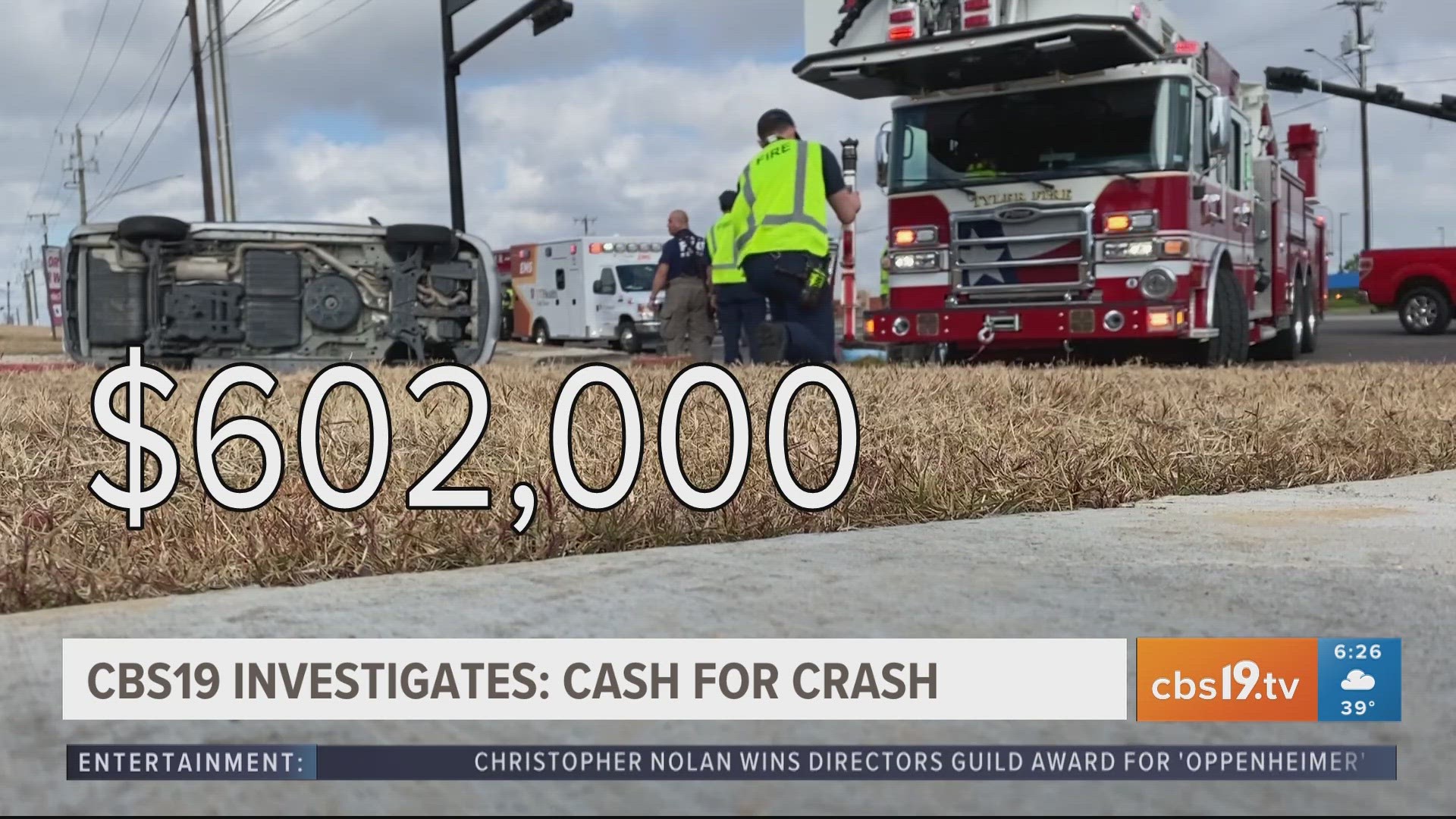TYLER, Texas — About 47,000 people travel in and out of the city of Tyler on a daily basis, according to Visit Tyler. But those people who work or shop here regularly could get hit with an extra bill if they're involved in a car crash.
A CBS19 investigation uncovered that the city of Tyler is sending crash cleanup bills to people who live outside of city limits. Further investigation revealed the practice is becoming more widespread in East Texas.
Driving comes with inherent risks. Seventy-seven percent of drivers get into at least one wreck in their lifetime, according to the National Highway Transportation Safety Administration.
People expect the bill for repairs after that crash, but what they don’t expect is to pay for the cleanup. In Tyler, what was once covered by the city’s budget, is getting billed separately for out-of-towners.
And it’s been happening for years.
The city of Tyler passed an ordinance in November 2019 to sign a contract with a third party billing company called Fire Recovery USA, which serves as a bill collector.
Tyler Fire Department Chief David Coble said it’s about saving money for the fire department.
"Some of the people who are having an accident here are not tax paying citizens here in Tyler. So, (when) they have an accident they are taking away the resources that the tax paying citizens in Tyler pay for," Coble said.
Public information requests to the city of Tyler revealed this program has collected $602,000 since it was implemented in 2019.
Once processed, the bill gets forwarded to a person's insurance company. If they decline to pay, Coble said crash victims aren’t on the hook for the money.
"If the company denies the claim, then that's it for us. We don't take it any further than that," Coble said
According to documents provided by the Tyler Fire Department, Fire Recovery USA submitted more than 3,400 claims since 2019. Of those claims over five years, 1,300 were denied. That’s more than a third of the claims.
Fire Recovery USA told CBS19 this fee is a way to recoup costs from crash victims for fire departments who are in need of extra funding.
"They need equipment. They need trucks. They need trucks so they can go out there and do their jobs and they don't have money for it," a Fire Recovery USA employee said.
Fifty-five miles away, the city of Palestine has been using the same crash fee collector since 2019.
Palestine Mayor Mitchell Jordan said the downsides outweigh the budget help.
"I know they are going after the insurance companies for that money, but all at the same time it makes insurance premiums rise. Eventually, ultimately the person driving the car will have to pay for that," Jordan said.
In five years, the city of Palestine has collected $8,000 through Fire Recovery USA.
"All money ain't good money, but the fact is we think the people who come to Palestine they're coming for good reasons. And if there's an accident, it's an accident," Jordan said.
Jordan agreed operating a successful fire department is costly; however this practice raises concerns.
"The image of it looks like its just a money grab and that's not what municipalities should be doing," Jordan said.
After CBS19 started asking questions, Mitchell is now considering prohibiting crash response fees.
"The proof is in the numbers. The $8,000 for what like five, six years it's not worth it in my opinion. But I really do think it's something that the council does need to look at and evaluate," Jordan said.
Back in Tyler, Coble said the fees are being used to purchase much-needed safety equipment.
"The suits that the guys wear just five years ago were costing us about $1,500. Now they're about $3,000. So, that personal protective equipment that they wear into a fire is twice as much as it was three or four years ago," Coble said. "Firetrucks have gone up 30 percent to 40 percent."
Coble said he does feel like the crash tax is worth it.
"We do feel like that we're doing our part to try to bring revenue into the city," Coble said.
Smith County Emergency Services District 2 has also implemented a similar program through a third-party bill collector called Emergency Solutions.
According to spokesperson Nikki Simmons, Smith County ESD2 has collected more than $1 million since 2019. Smith County ESD2 declined other requests for interviews.

